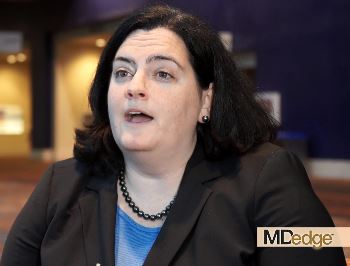User login
SAN ANTONIO – Younger breast cancer patients who undergo unilateral or bilateral mastectomy report lower breast satisfaction and poorer psychosocial and sexual well-being than counterparts who undergo breast-conserving surgery, finds a cross-sectional cohort study presented by lead investigator Laura S. Dominici, MD, FACS, at the San Antonio Breast Cancer Symposium.
The 560 women studied had a mean age of 37 years and had completed the BREAST-Q questionnaire a median of 5.8 years after their breast cancer diagnosis. Results showed that the mean score for satisfaction with breasts was 65.5 with breast-conserving surgery, 59.3 with unilateral mastectomy, and 60.4 with bilateral mastectomy (P = .008). The mastectomy groups also had poorer scores for psychosocial well-being (P less than .001) and sexual well-being (P less than .001), but not physical well-being. Most of the differences remained significant in meta-analysis. In a video interview, Dr. Dominici, of Dana-Farber Cancer Institute, Boston, discussed worry and anxiety about recurrence and second cancers as drivers of choosing mastectomy, generalizability of the study’s findings, and strategies for incorporating this new information into counseling and shared decision making.
Dr. Dominici disclosed that she had no conflicts of interest. The study was funded by the Agency for Healthcare Research and Quality, Susan G. Komen, the Breast Cancer Research Foundation, and The Pink Agenda.
SAN ANTONIO – Younger breast cancer patients who undergo unilateral or bilateral mastectomy report lower breast satisfaction and poorer psychosocial and sexual well-being than counterparts who undergo breast-conserving surgery, finds a cross-sectional cohort study presented by lead investigator Laura S. Dominici, MD, FACS, at the San Antonio Breast Cancer Symposium.
The 560 women studied had a mean age of 37 years and had completed the BREAST-Q questionnaire a median of 5.8 years after their breast cancer diagnosis. Results showed that the mean score for satisfaction with breasts was 65.5 with breast-conserving surgery, 59.3 with unilateral mastectomy, and 60.4 with bilateral mastectomy (P = .008). The mastectomy groups also had poorer scores for psychosocial well-being (P less than .001) and sexual well-being (P less than .001), but not physical well-being. Most of the differences remained significant in meta-analysis. In a video interview, Dr. Dominici, of Dana-Farber Cancer Institute, Boston, discussed worry and anxiety about recurrence and second cancers as drivers of choosing mastectomy, generalizability of the study’s findings, and strategies for incorporating this new information into counseling and shared decision making.
Dr. Dominici disclosed that she had no conflicts of interest. The study was funded by the Agency for Healthcare Research and Quality, Susan G. Komen, the Breast Cancer Research Foundation, and The Pink Agenda.
SAN ANTONIO – Younger breast cancer patients who undergo unilateral or bilateral mastectomy report lower breast satisfaction and poorer psychosocial and sexual well-being than counterparts who undergo breast-conserving surgery, finds a cross-sectional cohort study presented by lead investigator Laura S. Dominici, MD, FACS, at the San Antonio Breast Cancer Symposium.
The 560 women studied had a mean age of 37 years and had completed the BREAST-Q questionnaire a median of 5.8 years after their breast cancer diagnosis. Results showed that the mean score for satisfaction with breasts was 65.5 with breast-conserving surgery, 59.3 with unilateral mastectomy, and 60.4 with bilateral mastectomy (P = .008). The mastectomy groups also had poorer scores for psychosocial well-being (P less than .001) and sexual well-being (P less than .001), but not physical well-being. Most of the differences remained significant in meta-analysis. In a video interview, Dr. Dominici, of Dana-Farber Cancer Institute, Boston, discussed worry and anxiety about recurrence and second cancers as drivers of choosing mastectomy, generalizability of the study’s findings, and strategies for incorporating this new information into counseling and shared decision making.
Dr. Dominici disclosed that she had no conflicts of interest. The study was funded by the Agency for Healthcare Research and Quality, Susan G. Komen, the Breast Cancer Research Foundation, and The Pink Agenda.
REPORTING FROM SABCS 2018
